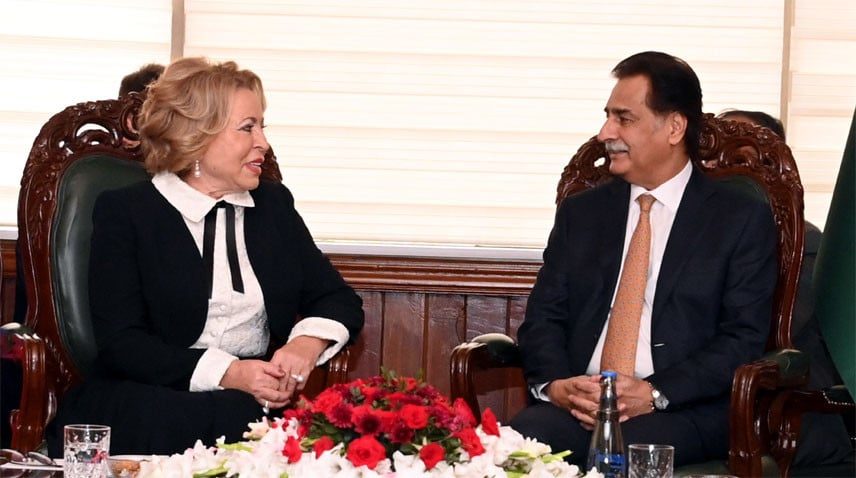Matvienko also held discussions with Senate Chairman Syed Yousuf Raza Gillani, exploring avenues to bolster economic, trade, and diplomatic relations between Pakistan and Russia

News Desk
MOSCOW: Valentina Matvienko, Speaker of the Federation Council of the Russian Federal Assembly, emphasized Russia’s recognition of Pakistan’s influential role on the global stage during her recent diplomatic visit to Islamabad, marking a potentially significant chapter in Pakistan-Russia relations. Matvienko’s meeting with National Assembly Speaker Sardar Ayaz Sadiq underscored mutual aspirations for enhanced cooperation, particularly within international forums like BRICS, for which Russia reaffirmed its support for Pakistan’s bid.
Commending Pakistan’s role in peace efforts, Matvienko highlighted the value of a multipolar world where collective action can foster regional and global stability. Her remarks signaled an intent for deepened diplomatic ties and collaborative initiatives, reflecting Russia’s strategic vision in South Asia, particularly as global power dynamics shift. The gesture of support for Pakistan’s membership in BRICS reflects an alignment with Pakistan’s foreign policy goals, as well as Russia’s interest in broadening the influence of the bloc to encompass diverse emerging economies.
In response, Speaker Sardar Ayaz Sadiq echoed Pakistan’s commitment to expanding cooperation with Russia, particularly through parliamentary diplomacy—a longstanding avenue for strengthening bilateral relations. He advocated for a sustained exchange of high-level visits and the establishment of parliamentary friendship groups, which aim to share legislative experiences and fortify mutual interests. This call for parliamentary engagement underscores Pakistan’s strategic use of diplomacy to bridge traditional geopolitical divides, particularly as it seeks to expand its role within the region and beyond.
Matvienko also held discussions with Senate Chairman Syed Yousuf Raza Gillani, exploring avenues to bolster economic, trade, and diplomatic relations between Pakistan and Russia. Gillani acknowledged the significance of Matvienko’s visit, describing it as a momentum-building event that could strengthen bilateral ties and regional cooperation. Appreciating Russia’s ongoing support in critical sectors such as infrastructure, oil, and gas, Gillani pointed to the potential for expanded investments, signaling a shift toward increased economic interdependence and resource-sharing between the two countries. As Gillani remarked, the already established Pak-Russia friendship group in Pakistan’s Senate demonstrates a structured commitment to fostering parliamentary relationships and increasing political dialogue.
The meetings underscored a shared interest in accelerating trade volumes and investment flows between the two countries, with both leaders stressing the necessity of removing trade barriers and exploring new sectors for collaboration. Such economic cooperation aligns with Pakistan’s need to diversify trade partnerships and Russia’s interest in South Asia as a strategic economic partner.



